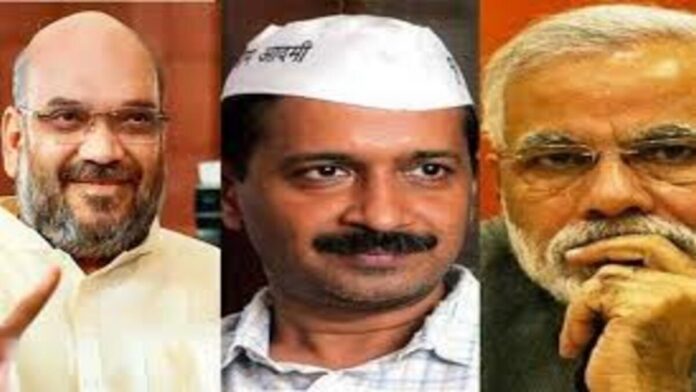Gujarat has been won by the Bharatiya Janata Party for 20 years by Narendra Modi. However, Modi not only surpassed his own record in these elections but also helped the BJP win the second-highest vote share and seat total in Gujarat’s electoral history. Modi dominated the campaign, participating in two roadshows and more than 30 rallies. He made the elections about his own reputation and the character of the state, and he was responsible for eradicating any regional vulnerabilities in the party state unit. He demonstrated to Gujarat his continued commitment to the state that helped him become a leader and demonstrated to the rest of India the source of his unbeatable local hegemony. Gujarat 2022 will allow Modi to enter the final full year of his second term unopposed and looming larger than ever in the public imagination, just like Gujarat 2012 did when it propelled him to the centre.
Amit Shah
Amit Shah began worked with Narendra Modi in Gujarat in 1987, helping him oversee local municipal elections for the BJP. 35 years later, Shah led the most successful BJP campaign in history using his influence as home minister, stature as the BJP’s number two, identity as a Gujarati leader with a pulse on the state’s Hindu sensibility, skills as an election micromanager par excellence, and position as a member of Parliament from the state’s capital. The victory strengthens Shah’s position as a key figure in the BJP’s electoral strategy and increases his political capital, which he may use to manage matters in Gujarat and have an impact on federal policy.
Rahul Gandhi
Rahul Gandhi disengaged from his campaign duties and thought that the best way to defeat the BJP was through an amorphous ideological conflict divorced from elections. Midway through the Bharat Jodo Yatra, he was confronted with reality when Gujarat’s voters handed the Congress the harshest punishment in the state’s history. The party did not only not fulfil the 2017 mandate and fulfil its job as an effective Opposition, but it also did not even run an effective campaign. The victory in Himachal may give the Congress some encouragement, although Gandhi had nothing to do with it because of local considerations. Thursday seemed to indicate once further that the Nehru-Gandhi family lacks the political stability necessary to compete with the BJP in 2024.
Arvind Kejriwal
In ten years, Arvind Kejriwal has transformed a Delhi-based movement into a national party and the city’s ruling party. He also successfully ran Punjab’s full state government. This is a notable accomplishment. Although not as much as he would have wanted, Kejriwal’s weight in the national political theatre will increase thanks to his victory in Gujarat, where he received over 10% of the vote share and contributed to making the campaign more competitive (and definitely not as much as is needed for a party to become the epicentre of a united Opposition). The Gujarat results also demonstrate how far AAP still has to advance. Voters are turned off by its ideological inconsistency, its Delhi model can be a talking point but fails to earn it a majority of supporters, and its leadership’s popularity has distinct upper and lower bounds. The future of Kejriwal and the AAP over the next ten years would depend on how he handles the shortcomings while leveraging the emerging electoral strength.
Mallikarjun Kharge
The first round of elections conducted under his leadership as Congress president will make Mallikarjun Kharge less powerful inside the party. Kharge’s Gujarat campaign was hobbled by an image issue, as he was perceived as supporting the Nehru-Gandhi family. Kharge’s challenge now will be to protect the party flock, handle the inevitable disputes over leadership in the state, and maintain the government for the whole five years. The Himachal victory does actually provide Kharge a third state for the party to control over. The state of Karnataka, which the Congress has the potential to win, will be Kharge’s next major test. Whether he can actually turn this into a victory will determine whether he has any autonomy as the party’s leader or is just a symbolic figure.
J P Nadda
Thursday was a melancholy day for BJP president. While the party achieved a historic victory in Gujarat under his leadership, Nadda was unable in delivering a victory in his own state. Undoubtedly, the incumbent was at a disadvantage in a state where the two parties have a history of switching off in the race. Nadda put a lot of effort into his campaigning, but he was unable to overcome the challenges presented by an unimpressive CM and anti-incumbency. It will also be disappointing to see how he handles internal conflicts. However, Nadda’s relationships with Modi and Shah, his cordial political approach, and his networks across the ideological parivar put him in excellent stead and are likely to secure him a second term as the party’s leader.




